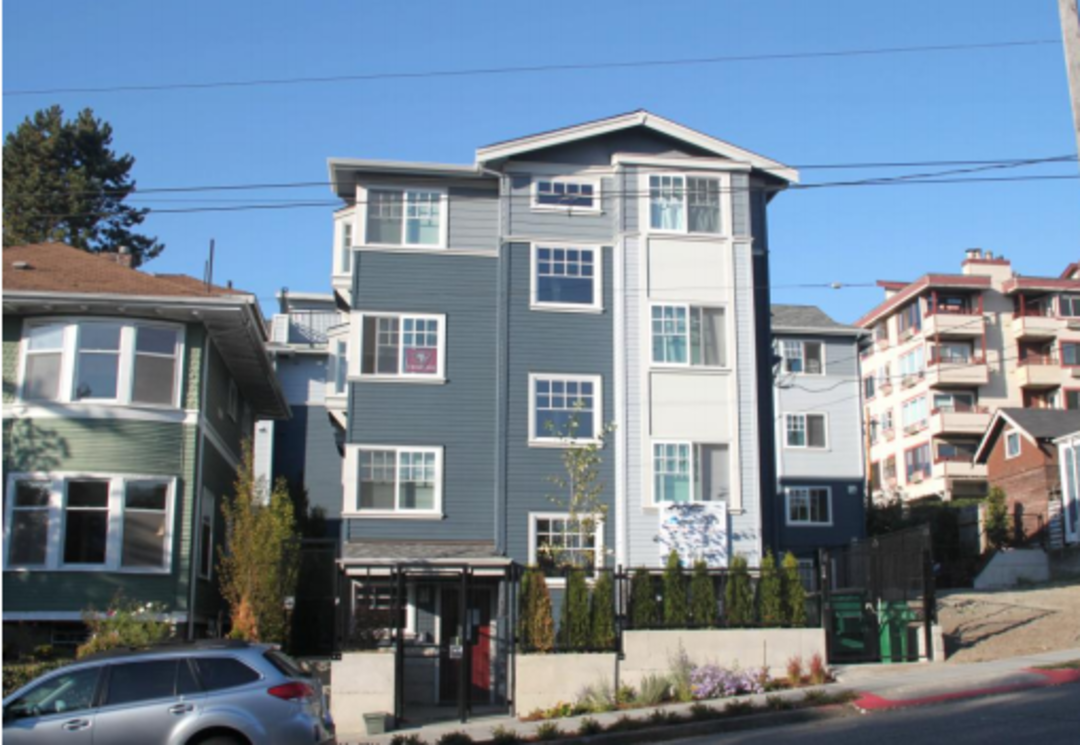The Pitchforks Come Out at aPodment Hearing

The C Is for Crank
The city council's transportation committee just held a group therapy session for opponents of micro-housing, or "aPodments," who showed up in overwhelming numbers, rhetorical pitchforks in hand, to a "brown bag" discussion this afternoon to express their opposition to the affordable developments, which consist of small units arranged around shared kitchens. (We toured Capitol Hill's Alturra aPodments last month.)
The buildings do not currently have to go through design review because, under the city's land use code, each floor of a building counts as a single unit with several (up to eight) bedrooms, so a building with 56 bedrooms would count as seven units—below the design-review threshold. Although opponents say this is an unfair loophole, proponents—and I'm one—argue that they provide affordable housing to people who otherwise wouldn't be able to live in the city, and that a lengthy design review process would make that goal harder to attain.
The battle lines on the council itself were clear in today's meeting, where council transportation chair Tom Rasmussen—the council's resident microhousing skeptic—spent much of the time before public comment asking representatives from the city's Department of Planning and Development and Office of Housing rhetorical questions that had the effect of making aPodments look bad.
For instance: Rasmussen, who is almost certainly well-versed in the design guidelines that govern aPodments, asked DPD's Mike Podowski whether an aPodment with 56 bedrooms would be subject to design review. Podowski responded that in most cases, it would not, but that of 48 microhousing developments the city has approved, "about half a dozen did go through design review."

Rasmussen then pressed Podowski about whether the city was accurately tracking the number of people living in microhousing for the purposes of calculating whether neighborhoods were meeting their growth targets; Podowski responded that because housing is calculated by unit, a seven-story building with eight bedrooms per floor would count as eight units. (On the other hand, a single-family house with eight residents would also count as a single unit).
Next, Rasmussen turned his sights on OH director Rick Hooper, asking him why it had taken the office six weeks to come up with a new rule that would eliminate an inconsistency between the way DPD and OH calculate the number of units in a building for purposes of design review and tax exemptions, respectively (we wrote about the inconsistency a couple of weeks ago). Hooper responded that OH had provided "a short grace period, to April 26," because several developers' financing depended on the old rules.Finally, after an hour of mostly rhetorical questions from Tom Rasmussen, it was time for the pitchforks to come out.
Rasmussen likened the new micro-apartment buildings to the single-room occupancy hotels of the 1970s, two of which burned down, killing dozens of residents. "Is our code up to date" to handle micro-apartments?, Rasmussen asked.
Podowski noted that the fire code has been updated since the 1970s (largely in response to the SRO fires), that the buildings have all the required sprinklers, and that the fire marshall has signed off on the floor plans. Incidentally. by Rasmussen's logic, the city should ban all dorms and hotels.
Finally, after an hour of mostly rhetorical questions, it was time for the pitchforks to come out.
Which is to say that the vast majority of the public comments were from opponents, many of them employing rhetoric that was almost eliminationist in its vitriol.
The few proponents who were able to show up included two developers and a handful of aPodment residents. The low number of supportive comments was hardly surprising: People with hourly jobs (that is, people who need affordable options like aPodments) can't take several hours off in the middle of the day as easily as people who are retired, salaried, or independently wealthy.
However, they did try, defending their housing choices; noting that most aPodment residents actually do stay in their homes for more than a year (14 months, on average, according to aPodment developer Dick Mulhair), and pointing out that microhousing is an affordable alternative for low-income working people who want to live close to where they work.
But most of the testimony was virulently opposed to the developments."These things are a cancer on our neighborhoods because they're growing without any regulation."
The arguments (mostly from self-identified single-family housing owners, several of whom also happen to be landlords) boiled down to a few basic themes:
1) aPodments are an ugly blight on Seattle's threatened single-family neighborhoods.
"Many people are totally surprised when suddenly a construction project erupts next door with no warning or notice whatever," Capitol Hill Community Council president George Bakan said.
Another speaker, Barbara Anderson, asked, "Does affordable housing trump everything? Do the people who have built the character of the neighborhood have no right to shape its future?"
And Dennis O'Leary, a Capitol Hill resident, said that he drives past aPodment developments every couple of days, and "there's no attraction to them at all, no appeal. The one on John looks like it's swallowing the house next to it. ... I would like to see some beauty, greenery, and concern for the neighborhood."
2) aPodments bring the "wrong kind" of people to neighborhoods—people who may move away and don't have families, for example.
Chaplain Gary Friedman, a resident of Roosevelt, said aPodments were basically just "college dormitories that are being placed in our residential area. ... These are not being built for people who are looking for long-term housing. ... They're not family-friendly and they're not compatible with our neighborhood."
Capitol Hill single-family homeowner Barbara Muller argued that microhousing shouldn't be called "multi-family," because "Using the world 'family' for a person who lives alone seems to be a misuse" of multifamily tax policies.
Another Capitol Hill homeonwer, Steve Gray, said that he doesn't feel like he can "raise my family in a great neighborhood" anymore because of a microhousing development going up next door to his single-family home.
And one woman testified that aPodments would quickly be overrun by mold, "meth addicts," "wild parties," people with "mental illness," and men who will terrorize "our daughters." (Then, in a classic case of concern trolling, she worried that microhousing residents wouldn't be able to cook decent food, because they'd have filthy shared kitchens and in-unit microwaves that wouldn't "even be big enough for a Hungry Man dinner.")
3) aPodments are out of character with Capitol Hill/Ravenna/Laurelhurst/the U District and won't age well.
Roosevelt Neighbors' Alliance board member Andrea Perr told the council: "These things are a cancer on our neighborhoods because they're growing without any regulation. ... My house is 100 years old. It still looks nice because it's been maintained through the years. These things---I'm worried about them."
4) DPD is sneaking aPodments past neighborhoods because ... well, no one really addressed the question of why.
Central Area activist Bill Bradburd (a landlord) accused DPD of "obfuscation," adding that "there's this massive gaping, flushing sound of these projects running through"—implying, I guess, that the projects are akin to what one might find in a toilet.
And Capitol Hill aPodment opponent Carl Winter (also a landlord) said DPD overseeing aPodment development was "a classic case of the fox guarding the hen house." (In an inadvertent malapropism, Winter also testified, "I'm not a land use expert, but after listening to the testinomy today, I realize that I'm among my peers." We couldn't agree more.)
And finally, 5) aPodments won't solve the city's affordable housing problem, so they shouldn't be allowed.
"We desperately need more affordable, entry-level housing, but ... aPodments will never provide affordable housing to those who need it," Eastlake's Jules James said.
Another commenter testified that aPodments were a bad idea because they won't solve the problem of homelessness.
Rasmussen, as we've reported, may propose a moratorium on micro-housing development.




